An artificial intelligence (AI) call center is a customer service platform that uses AI technology to streamline voice interactions, enhance agent productivity, and generate real-time insights. Service providers are using AI models to offer capabilities like live transcription, chatbots, and sentiment analysis. From reducing long wait times to managing high call volumes, an AI call center is a strategic asset for delivering exceptional customer experiences.
How AI Call Centers Work
AI call centers integrate different language models trained on a set of data to identify patterns and make decisions without human intervention. Deep learning enables these systems to evolve and adjust their algorithms through inputted data, such as recorded conversations, chat logs, customer profiles, and previous inquiries. This capability is essential for delivering real-time, accurate information and personalized experiences.
Call center providers use machine learning (ML) technology to develop an algorithm that enables their software to learn from data and make predictions. Natural Language Processing (NLP) is a subset of ML that equips call center software with the ability to comprehend human language and written texts.
For example, chatbots use ML to refine their responses with each interaction. As the chatbot engages with more customers, it learns to recognize common queries, preferred solutions, and communication styles. Through NLP, chatbots can analyze the customer’s sentiment and intent, improving their ability to assist customers effectively.
Speech recognition is a prominent feature in AI call centers, which combines ML and NLP. These AI components work together to convert spoken words into texts (or commands) and vice versa. To facilitate interactions, it uses acoustic and language models to understand accents, jargon, and speech patterns.
Finally, modern call center software incorporates conversational AI, enabling computers to analyze and effectively communicate with humans through content analysis and text categorization. In automated phone systems, this technology allows interactive voice response (IVR) systems to interact with callers through human language.
Key Features of AI Call Center Solutions
AI has transformed the call center industry by offering a range of features that enable efficient management of interaction volumes and customer expectations. To better explore AI for call center use, we listed the most commonly used AI features and their key functionalities.
Live Transcription
Also known as speech-to-text transcription, this AI feature uses NLP to convert spoken words into written text in real time. Agents and managers can enable this feature in phone calls and video meetings, allowing them to follow through conversations and conduct quality assessments.
Dialpad Contact Center uses voice transcription software that has analyzed over four billion minutes of audio and messaging data. It transcribes calls as they happen and displays them in your active call window. Dialpad Contact Center retains full ownership of a proprietary AI engine, allowing businesses to benefit from its truly AI-powered contact center solution.
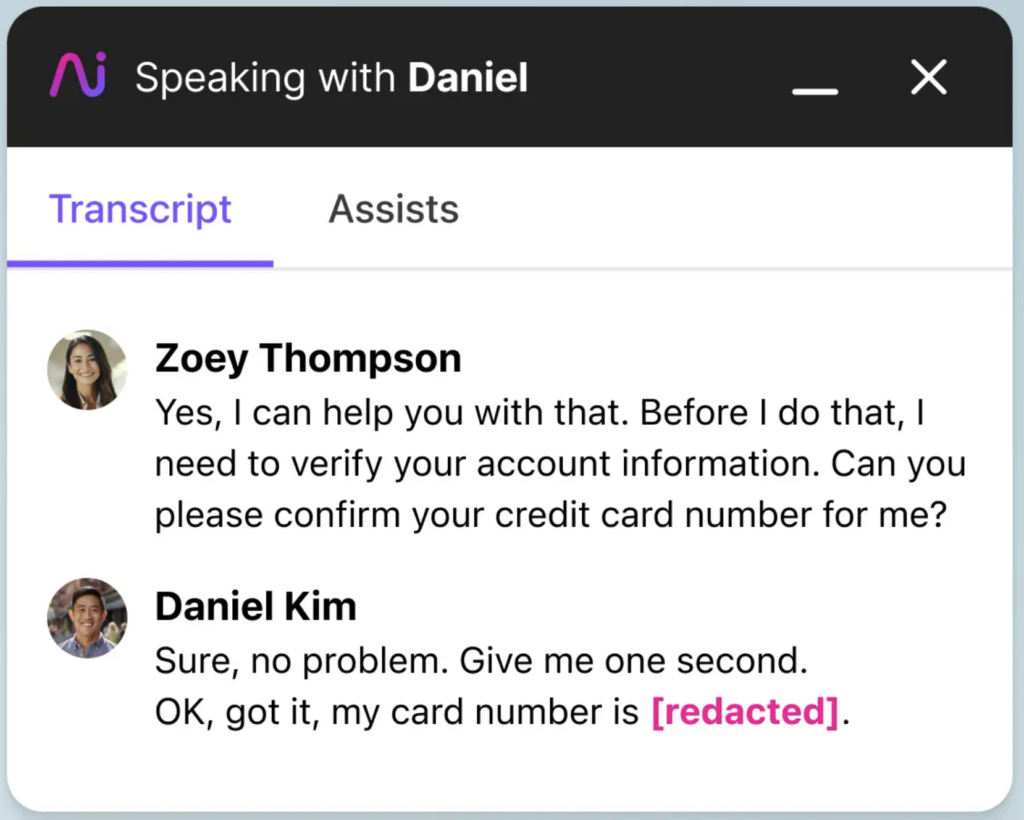
Dialpad transcribes agent and customer interactions in real time. (Source: Dialpad)
Virtual Agent
A virtual agent may refer to a chatbot or voicebot that engages with customers through voice or text interactions. It relies on ML to understand the meaning and context of a customer’s message.
Call centers use virtual agents for self-service to create an automated system for handling basic concerns. They are good at handling admin tasks, such as collecting data, answering FAQs, tracking orders, and updating account information.
Since virtual agents rely on algorithms and data patterns, they lack the flexibility and judgment to address complex requests. If the virtual agent recognizes the concern is beyond its capabilities, it will hand off the conversation to a live agent.
Talkdesk offers a virtual agent tool that relies on generative AI to provide contextual responses to customer inquiries. Like Dialpad, Talkdesk unlocks the power of AI for contact centers to intelligently resolve issues and communicate with customers on any digital channel.
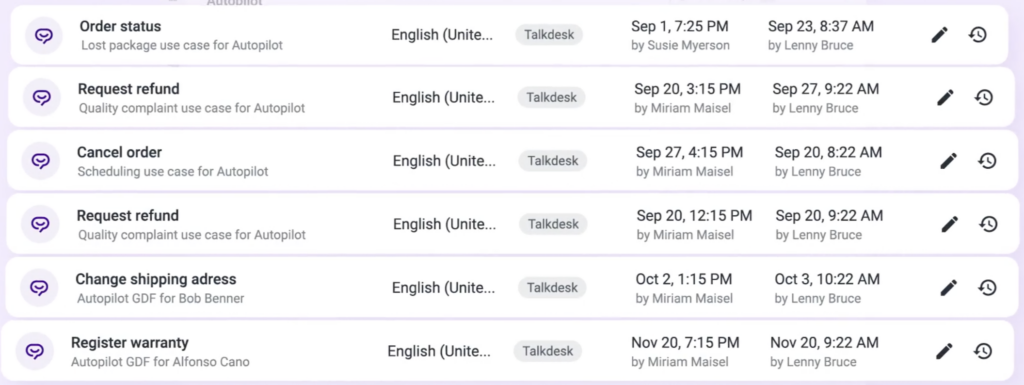
The Talkdesk Autopilot ensures agents provide consistent answers. (Source: Talkdesk)
Speech Analytics
Speech analytics examines conversations between agents and callers, providing valuable insights into what specific issue triggers customer satisfaction or frustration. To understand the caller’s intent, it detects the effort, sentiment, and language patterns based on the words used. The collected data empowers agents to take action that can make a difference between keeping or losing customers.
CloudTalk offers a sentiment analysis tool that classifies each caller’s phrase as a positive, negative, or neutral attitude. It explores the topics discussed and the key moments within the transcript. This provider uses conversational intelligence to measure the caller’s interest and identify objections in interactions.
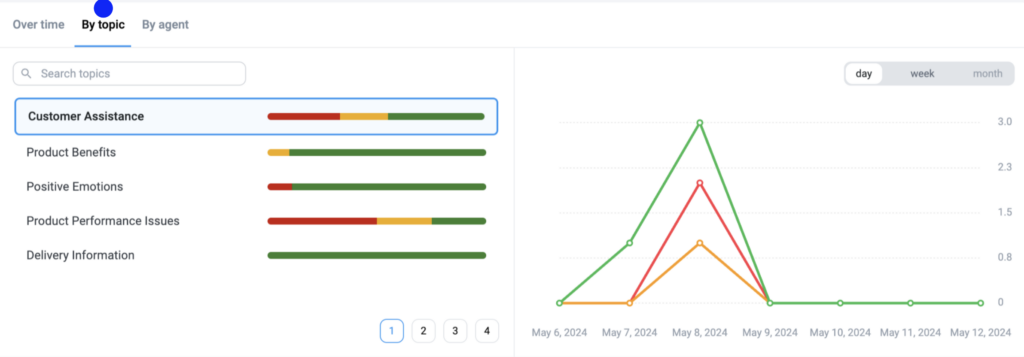
Identify the sentiments on each of the topics discussed in a call. (Source: CloudTalk)
Intelligent Call Routing
AI significantly enhances call center efficiency by routing callers to the most suitable agent to address a specific concern. It uses NLP to understand voice requests and smart algorithms to analyze the caller’s input against preset rules. These rules consider multiple factors, including the intent, agent’s skill, language preference, and priority ranking.
RingCentral Contact Center allows users to select an AI-assisted routing configuration that best fits their automated phone system needs. It combines AI predictive behavioral routing with queue management to ensure callers don’t wait too long for a qualified agent to handle their concerns.
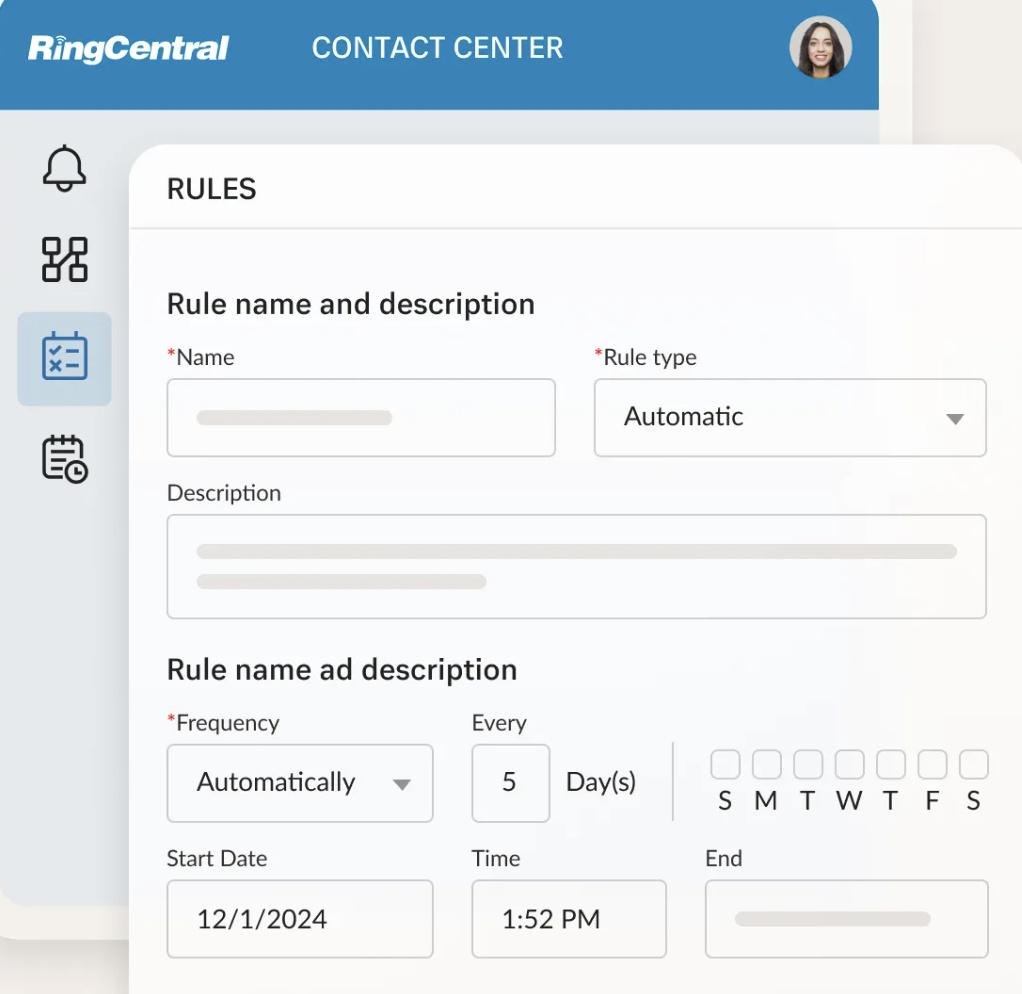
Set the rules and criteria for incoming call volume. (Source: RingCentral)
Agent Coaching
Coaching tools in AI call centers function as a knowledge base for agents needing immediate answers to customer questions. Through AI and automation, the system presents the next best action recommendations, saving agents time from manually pulling the data and knowledge they need.
The Genesys Cloud Agent Copilot supports agents in handling customer inquiries as they happen. It uses multiple AI forms, including generative and conversational AI, to create an automated system that provides relevant information and suggests responses in real time.
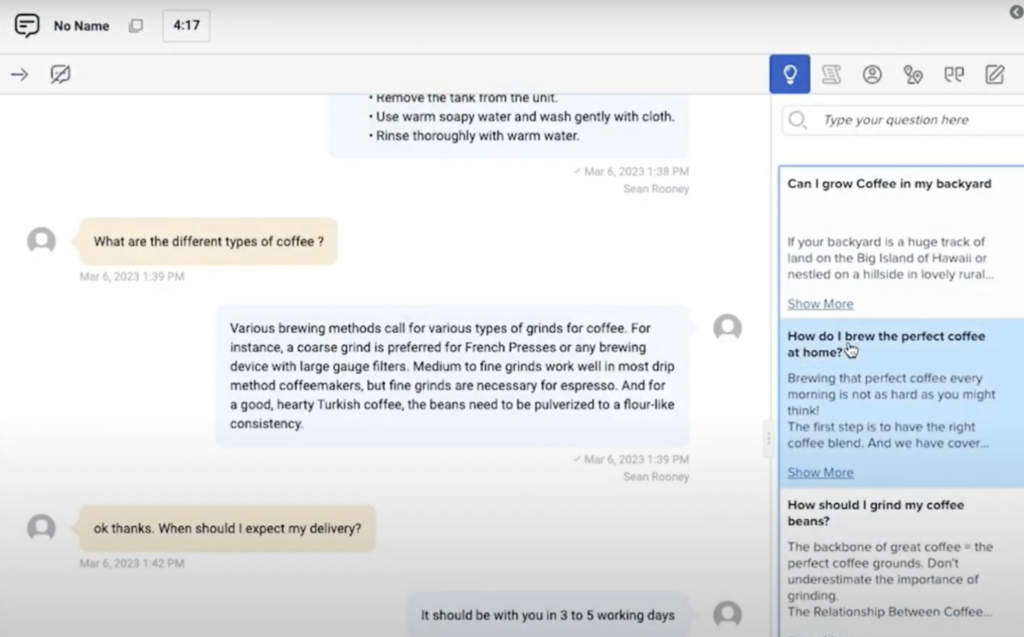
The Genesys Copilot autogenerates knowledge base articles based on the current customer interaction. (Source: Genesys Cloud)
Benefits of AI in Call Centers
While AI for contact centers charges higher monthly per-user fees than traditional call center systems, it offers significant value for money because of its substantial benefits.
In a survey by Deloitte, 81% of contact center leaders are investing in AI to enhance agent experience and operational efficiency. Given this widespread adoption, it’s worth exploring why call centers increasingly integrate AI into their customer service strategy.
- Enhances agent productivity: Smart call routing systems benefit agents by eliminating the time spent on routine tasks, such as basic inquiries and data collection. This enables agents to focus on high-value interactions that require more focus and expertise. Additionally, AI equips agents with coaching tools that effectively address customer issues, reducing the need to search for answers or escalate calls.
- Increases customer satisfaction: AI call center features are crucial in delivering personalized customer service, particularly self-service tools that empower callers to get the answers they need without waiting in a queue. Meanwhile, intelligent systems like chatbots can instantly understand a query and extract data from past interactions, giving customer interactions a more personalized touch.
- Provides valuable insights: Advanced analytics provide data-driven insights into customer behaviors and agent performance, allowing companies to identify areas for improvement and conduct quality assessments.AI-powered call analysis can reveal common issues, recurring trends, and customer’s feelings about your brand. AI also compiles critical call center metrics to help you refine your customer service strategy.
Best Practices in Implementing AI for Call Centers
Like any technology, learning the best practices in call centers is key to reaping the full potential of AI. To ensure a successful implementation, start with a clear strategy that aligns with your business goals. Here are some guidelines to consider when setting up your AI call center:
- Conduct agent training: While AI tools have become increasingly intuitive, agents and supervisors need continuous access to training to use these tools effectively. Offer in-depth training on how AI can help them automate routine tasks and provide personalized service. You may schedule an onboarding training with the call center provider to gain hands-on experience.
- Integrate with existing business apps: Integrating your current tech stack with AI call center software facilitates seamless communication between two separate applications.It establishes automated workflows and data sharing, so there’s no need to manually encode data, minimizing the risk of errors. AI call centers readily integrate with customer relationship management (CRM) systems so agents have access to customer data within a unified interface.
- Continuously monitor agent performance: AI call centers come with a call reporting dashboard that displays critical metrics or KPIs, allowing you to closely monitor agent performance and service quality. You can also use the reporting functionality to evaluate how agents are using AI features in your call center and determine whether these tools are contributing to your company objectives.
- Use AI-driven insights to improve customer experience: AI-powered analytics can process huge amounts of data in your call center. Leverage these tools to identify data patterns and inform your decision-making process. For example, sentiment analysis lets you measure customer satisfaction and use those insights to train agents to foster more empathetic interactions.
Top Providers of Call Center AI Solutions
A Talkdesk 2024 report revealed that AI has improved customer and agent experiences amid increasing call volumes. Customer experience platforms leverage AI call center technology to deliver cutting-edge features and improve service delivery. If you’re ready to explore AI for your call center operations, we list the top providers below to help you explore your options.
Business Phone System Provider | Monthly Starting Price (per User) | AI Features | Learn More |
|---|---|---|---|
| |||
 | $95 |
| |
 | $34 |
| |
 | $85 |
| |
 |
| ||
Frequently Asked Questions (FAQs)
No. Artificial intelligence in call centers aims to complement human interaction, not completely replace agents. The role of AI is to offer tools that simplify agents’ tasks and handle routine processes so they can focus more on more complex interactions that demand human understanding, empathy, and decision-making.
AI in customer service refers to the use of intelligent tools to provide efficient and personalized customer experience. It encompasses multiple uses, including 24/7 service availability, intelligent routing, agent coaching, and multilingual support.
No. A survey by Gartner[1] revealed that 64% of customers would prefer that companies don’t use AI in their customer service. While this is a concern, companies can leverage AI by exploring ways to integrate AI capabilities into their services seamlessly. This includes using chatbots to collect information from callers and transferring them to a live agent when necessary.
Bottom Line
Implementing AI in call center operations empowers businesses to adopt new capabilities that enhance the customer service experience. While most customers still prefer human agents over intelligent technology, companies should strike a balance where AI simply supports interactions but doesn’t completely replace agents. This approach preserves the human touch and customer value and increases efficiency and personalization.